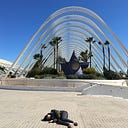Silicon Valley Diary / 矽谷日記
Most of the time, I think San Francisco, aka Silicon Valley/Bay Area, is a pretty shitty place to live in. Overoptimization, lack of humanity, overhype about anything related to technology, and full of injustice + inequality…For instance, I was super annoyed by one of the cults here that loves techno-optimism. They said the government should not regulate technology for better advancement for humanity, aka we shouldn’t regulate AI at all. Anyway, I can write a big ass essay to shit on it. The only thing I like about it is the tolerance to weirdos and weirdo ideas.
Living here, I feel I’m the normal one, not the really weird one. Lots of people here are “on the spectrum.” However, after reading Chip War, a story on chip, aka the story of Silicon Valley, I started to see where this culture comes from and the bright side of it.
Most of the big companies today are started from garages or restaurants (like HP, Apple, and Google) with engineers who are excited about building new technologies. It’s a strong culture of invention and disruption, like the way I’m seeing now. To be honest, I see so many AI startups every day and most of them seem to be quite stupid for me. But no one here dares to it’s stupid because history has underestimated how much people here can do.
From Chip War, I started to understand why there are so many stupid startups here. Intel started with DRAM (chips for computer memory), almost killed by the rise of Japanese companies like Toshiba, but took a big risk by heavily investing in EUV (Microprocessor) with ASML to thrive. However, they got quite comfortable with the x86 profits for personal computers, missing all the computation (GPU, TPU) that computation for AI needs. This is similar to the story of the founder of TSMC, Morris Chang. During the financial crisis, Morris Chang fired his executive because the person was trying to lay off and cut costs, while he thought this was the best time to invest, resulting in big orders from Apple’s smartphone device. Most of the story shows that survival/success relies on risk-taking innovation and investment. Seeking risk is the culture of Silicon Valley.
I started to realize the power of living here and see how technology evolved into the AI I see today. It’s not only about that AI will be the next big future, and I want to be a part of it. It’s also about if I want to build my crazy idea in the future, I need to stay here for the network and the money. Even though there are many parts that I dislike about the Bay, there is no doubt that I will be a very good engineer, immersing in the most advanced technology, and hopefully opening another door to change humanity.
PS: And also have a place for my family when China invades Taiwan
大部分時間裏,我覺得舊金山,也就是矽谷/灣區,是個相當糟糕的居住地。這裏過度優化、缺乏人性、對任何與技術相關的事物過分炒作,充滿了不公和不平等……比如,這裏一個熱衷於技術樂觀主義的「教派」非常惱人。他們說政府不應該爲了人類更好的進步而對技術進行管制,也就是說我們根本不應該對人工智能進行任何管制。不管怎樣,我可以寫一篇長篇大論來批評這一點。我唯一喜歡的就是這裏對怪人和奇怪想法的寬容。
住在這裏,我感覺自己是正常人,而不是真正的怪人。這裏很多人都在“譜系上”。然而,在閱讀了《晶片戰爭》一書後,這是一部關於晶片的故事,也就是矽谷的故事,我開始理解這種文化的來源和它的好處。
如今的大多數大公司都是從車庫或餐廳(如惠普、蘋果和谷歌)開始的,那裏的工程師對構建新技術充滿熱情。這是一種強烈的發明和破壞文化,就像我現在所看到的。老實說,我每天都能看到很多人工智能新創公司,大多數對我來說似乎都相當愚蠢。但這裏沒有人敢說它們愚蠢,因爲歷史低估了這裏的人們能做到的事情。
從《晶片戰爭》中,我開始理解爲什麼這裏有這麼多愚蠢的新創。英特爾最初以DRAM(計算機內存晶片)起家,幾乎被東芝等日本公司的崛起所擊敗,但通過大量投資EUV(微處理器)與 ASML 共同繁榮,冒了很大的風險。然而,他們對個人電腦的 x86 利潤感到相當滿足,而錯過了所有計算(GPU,TPU)對人工智能所需的計算。這與台積電創始人張忠謀的故事類似。在金融危機期間,張忠謀解僱了他的經理,因爲那人試圖裁員和削減成本,而他認爲這是投資的最佳時機,結果爲蘋果智能手機設備帶來了大量訂單。大多數故事表明,生存/成功依賴於冒險創新和投資,尋求風險是矽谷的文化。
我開始意識到生活在這裏所具備的力量,看到技術如何發展成我今天所看到的人工智能。這不僅僅是因為我想參與人工智能,下一個大未來的一部分,也是關於如果我將來想要打造我的瘋狂想法,我需要留在這裏爲了人脈和資金。儘管我不喜歡灣區的很多部分,但毫無疑問,我會成爲一個非常優秀的工程師,沉浸在最先進的技術中,並為打開另一扇改變人類的大門。
PS:住這裡也可以在中國入侵臺灣時爲我的家人提供一個避難所。感謝 AI 的翻譯,錯誤真多,語調也真奇怪。
